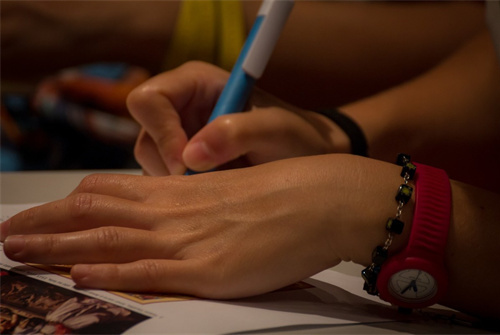诺贝尔文学奖阿列克谢获奖感言
我其实不是一个人站在这领奖台上。
小时候我和小伙伴喜欢在户外玩耍,但是每当夜幕降临,疲惫的村妇们一起坐在农舍边的长凳上开始讲故事时,她们的声音就会像磁石一样吸引我们。
这些妇女没有一个人有丈夫、父亲或者兄弟。
二战之后,我几乎看不到村子里有男人出没。
战争期间,四分之一的白俄罗斯人丧生,有些死于前线抗击敌人,有些死于后方和敌对游击队的战斗。
我从童年时代就已经明白了爱的真正内涵。
每当我走在街上,记录下听到的各种词汇、短语和感叹时,我都会在想:有多少小说都没有痕迹地消失了啊
人们还不能直接把他们生活中的对话记录下来作为文学作品,因为人们不懂得去欣赏这些对话,也不会因为读它们而感到惊讶或者快乐。
我喜欢人类交谈的方式,我喜欢寂寞的人声。
为什么关于战争
因为我们是战争中的人——我们一直在战争或者准备战争。
在家里,在街上。
这也是为什么这个国家的人命如此廉价。
一切都是战争。
在一次旅行中,我遇到了一个女人,她在二战期间是一名医疗兵。
她告诉我一个故事:冬天她们穿过拉多加湖时,敌人注意到了风吹草动,开始朝她们射击。
人和马都摔在了冰上,这一切都发生在夜里。
她抓住一个受伤的人,开始把他拖向岸边。
‘我拉着他,他全身赤裸湿透,衣服都被撕烂了。
’她对我说。
到岸后,她发现自己拽的是一条巨大的受伤的鲟鱼,这个女人想到:人类在受苦受难,但是动物、鸟和鱼,它们做了什么
在另一次旅行中,我听到了另一个医疗兵的故事。
在一次战斗中,她把一名受伤的士兵拉到弹坑,突然发现这是一名德国兵。
他的腿断了,不停流血。
他是敌人
怎么办
自己这边的人全死了。
但是,她还是帮德国兵包扎好,随后又跑出来,拖着一名失去意识的苏联兵来到弹坑。
苏联兵见到德国兵时,双方都拔枪想杀了对方。
我给了苏联兵一耳光,又扇了德国兵一耳光。
我们的腿都浸没在血泊中。
彼此的血融在了一起。
女人的战争,而不是英雄的战争,不是一方英勇地杀死了另一方。
我记得女人们频繁地哀叹:一场战役后,你穿过田野,他们都躺在那里……都很年轻,很英俊。
他们躺在那里,看着天空。
你为他们感到难过和惋惜,战争双方的人。
战争无非就是杀戮。
这是女性记忆中的战争模样。
‘消失’是女人谈论最多的东西,战争可以很快将一切化为乌有,不管是人命还是时间。
男人们十七八岁就志愿上前线,但并不意味着他们想杀人。
但是,他们准备随时赴死。
为了祖国而死。
为了斯大林而死。
这些是无法从历史中抹去的词。
俄罗斯文学的有趣之处在于,它讲述了在一个大国实施一场实验的故事。
我经常被问到:你为什么总是写悲剧
因为这就是我们的生活。
现在我们住在不同的国家,但是‘红’人无处不在。
他们来自同一个国家,曾拥有相同的生活,有着相同的记忆。
在我的祖国,孩子们从小就了解死亡。
我们被教育了死亡的含义。
我们被告知人类的存在就是为了奉献一切,牺牲自我。
我们被教会如何用武器去对待别人。
邪恶是冷酷无情的,你必须要对此打个预防针。
”阿列克谢耶维奇说,他们是在行刑人和受害者之间成长起来的,他们的生活环境是被玷污的,“我已经写了五本书,但我感觉到它们都是同一本,都在讲述乌托邦的历史。
过去有段时间,整个20世纪没有一个政治理念可以和共产主义(以十月革命为象征)相提并论,共产主义比任何其他事情都更强烈且富有感染力地吸引着西方知识分子。
但是实际上,共产主义理想已经至少2000多岁了。
我们可以在柏拉图的理想国里找到它的渊源;在阿里斯多芬尼斯有关‘万物共享’的梦里看到它的影子;历史上还有托马斯·莫尔和托马索·坎帕内拉,圣西蒙,傅里叶和罗伯特·欧文这些人。
俄罗斯人的骨子里有一种精神推动着他们去试图把这些梦想变成现实。
我那位至死都相信共产主义的父亲把党员卡留到了最后。
我的父亲、我的朋友以及我身边的许多人,他们都来自同一个地方——社会主义,他们之中有许多理想主义者、浪漫主义者。
但在今天,他们会被称为‘被绑架的浪漫主义者’,或者‘乌托邦的奴隶’。
我相信他们所有人本都可以过上不一样的生活,但他们还是选择了苏联式生活。
为什么会这样
为了找到答案,我花了很长一段时间。
我行走于这个曾被称为苏联的幅员辽阔的土地,并留下了成千上万的磁带。
我一点点地回顾社会主义的历史,回顾社会主义对人类的影响。
我发现人类其实是很小的概念,尤其具体到我们每一个人。
但在现实中,人类让一切发生皆有可能。
白俄罗斯的土地,那里是我父亲的家乡,那儿有我的整个人生;乌克兰,我母亲的家乡、我出生的地方;以及俄罗斯的伟大文化,没有它我不能想象自己。
我很爱这三个家。
但是在这个时代,我们很难谈爱。
谁有Yeats 诺贝尔文学奖的获奖感言的译文
莫言说:我的中国名叫做闭嘴
约翰·斯坦贝克的诺贝尔文学奖获奖感言中文版
瑞典皇家文学院认为我的作品有资格获得这一最高的荣誉,我对此谨致谢意。
对于自己是否超过了其他我所崇敬的作家而当之无愧地获奖,我在内心深处表示怀疑;但毋庸置疑,我对自己能有幸获奖,则是既欣喜而又引以为豪的。
依照惯例,获奖者应就文学的性质与方向发表学术见解或个人之见。
可我认为,在这特定的时刻,思考一下作家的崇高义务和职责,倒是十分适宜的。
诺贝尔文学奖和我此时站立的这个讲坛名闻遐迩,因此,我不应该像一只感恩戴德的老鼠一样,吱吱地抱歉不休,而应该如一只雄狮那样,为自己的职业以及长期以来从事这一职业的伟人和善者发出吼声。
文学不是由一群苍白懦弱、吹毛求疵、在空旷的教堂里祈祷的教士们传播的,它既不是供深居简出的特权阶层娱乐的,也并非是陷于绝望、但又喜好自吹的乞丐们的一种游戏。
文学与言语一样源远流长,它是应人们的需求而产生的,除了对这种需求的日益增长外,文学并没有发生什么变化。
吟唱诗人、行吟诗人和作家并不是独立的和相互排斥的,从一开始,他们的作用、义务和职责就由我们人类规定好了。
人类一直经历着阴沉暗淡的混乱年月。
我的伟大先驱,威廉`福克纳在此地发表演说时,曾把这种情形称为一种普遍的生理恐惧而导致的悲剧;这种情形持续了如此之久,以至于精神问题已不复存在。
正因为如此,唯有相互冲突的人类之心才值得描写。
福克纳比大多数人高明,他既了解人类的力量,又了解人类的弱点;他知道,理解和消除恐惧是需要文学家存在于世的一个重要理由。
这并不是新颖的观点。
作家自古领受的任务并没有改变。
他们负有暴露人类那许多可悲的缺点和失败的职责,并且为了人类进步而有责任把我们的阴郁噩梦暴露于光天化日之下。
此外,作家有义务宣告并赞美人类经过考验而形成的能力,即豁达的胸怀,崇高的精神,虽败不馁的斗志,以及勇敢、热情和仁爱。
在同怯懦与绝望进行的永不停息的斗争中,这些是充满希望和进取精神、振奋人心的光辉旗帜。
我认为,一个作家如不满怀激情地相信人类具有臻于完美的能力,那么他在文学方面就会毫无建树,也不该在文学领域中占有一席之地。
当前普遍存在的恐惧是,我们在认识和处理物质世界的一些危险因素时,引起了一种滚滚向前的浪潮。
诚然,人类认识的其他阶段尚未赶上这一巨大的步伐,不过,丝毫没有理由假定,这些方面不能或不会与之齐头并进。
无疑,作家的部分职责就是确保它们一起向前发展。
人类曾坚定不移地与一切自然界的仇敌进行斗争,有时几乎不可避免的失败和毁灭,既然我们有着如此悠久并值得自豪的历史,那么,倘若我们还未能取得伟大的胜利就逃离战场,那我们就成了懦夫和愚人。
(还有几段文字看不清楚,怪书虫了。
)
阅读莫言领诺贝尔文学奖获奖感言及演讲《讲故事的人》,就你感兴趣的语段谈谈你的看法明天早上就要,急
服了你们老师,给你们出这么难的题目,这不是小孩子该想的,他表达的情感太复杂,或者说被人们太多复杂的解读,都不是大人能搞明白的。
他写的都是灾难的时代,或者他自己感受过的种种苦难,我估计是小孩子的时候挨饿,给他创伤太深,同样的事情,儿童眼里看来就会特别残酷,而且这种残酷和讨厌虚伪的感觉,到老不能改。
所以,他写了一个无情但无私的世界
一个母亲善良但社会虚伪恶劣的世界
你不觉得这很分裂吗。
那些个时代荒谬,但人们的逻辑并非那么不可理喻,跳出来看,为什么会犯错大体是清楚的。
我不是说不存在深切的虚伪和苦难,还有人性的种种恶劣不光明的一面,政治也有肮脏的一面,就像你邓爷爷说的,制度订的不当,会让好人不能充分做好事,坏人趁机干尽坏事(甚至好人也能干坏事)----------这些道理,我们全民早懂了阿
------我不知道看些精致的怨言有什么教益,易地易时作人,你也会同样陷进坑里。
我可以理解,或者说尽量理解他的苦难,但是不接受他的观点,也不喜欢找他的文章看,我宁愿要纪实文学,或者现实主义的描写(就像那谁说的,到老了明白最好的文学是直接去写,不要靠卖弄才气--------我好像也明白了),不要变形,夸张和嘲弄--------不要讲故事的书看。
---------对了,他告诉你,他描写的人物,原型和小说很不同的,我在意这个。
-----------------------------------对了,他的文章原本应该是写给我们这些国人看的,他不可能写作时就想象到哪篇为争取诺奖而写-------这一点对于怎么理解他,和他的文章,并非不重要。
-----尤其是中国人,都懂得,嘛叫内外有别?
约翰·斯坦贝克的诺贝尔文学奖获奖感言
Banquet SpeechJohn Steinbeck"s speech at the Nobel Banquet at the City Hall in Stockholm, December 10, 1962I thank the Swedish Academy for finding my work worthy of this highest honor.In my heart there may be doubt that I deserve the Nobel award over other men of letters whom I hold in respect and reverence - but there is no question of my pleasure and pride in having it for myself.It is customary for the recipient of this award to offer personal or scholarly comment on the nature and the direction of literature. At this particular time, however, I think it would be well to consider the high duties and the responsibilities of the makers of literature.Such is the prestige of the Nobel award and of this place where I stand that I am impelled, not to squeak like a grateful and apologetic mouse, but to roar like a lion out of pride in my profession and in the great and good men who have practiced it through the ages.Literature was not promulgated by a pale and emasculated critical priesthood singing their litanies in empty churches - nor is it a game for the cloistered elect, the tinhorn mendicants of low calorie despair.Literature is as old as speech. It grew out of human need for it, and it has not changed except to become more needed.The skalds, the bards, the writers are not separate and exclusive. From the beginning, their functions, their duties, their responsibilities have been decreed by our species.Humanity has been passing through a gray and desolate time of confusion. My great predecessor, William Faulkner, speaking here, referred to it as a tragedy of universal fear so long sustained that there were no longer problems of the spirit, so that only the human heart in conflict with itself seemed worth writing about.Faulkner, more than most men, was aware of human strength as well as of human weakness. He knew that the understanding and the resolution of fear are a large part of the writer"s reason for being.This is not new. The ancient commission of the writer has not changed. He is charged with exposing our many grievous faults and failures, with dredging up to the light our dark and dangerous dreams for the purpose of improvement.Furthermore, the writer is delegated to declare and to celebrate man"s proven capacity for greatness of heart and spirit - for gallantry in defeat - for courage, compassion and love. In the endless war against weakness and despair, these are the bright rally-flags of hope and of emulation.I hold that a writer who does not passionately believe in the perfectibility of man, has no dedication nor any membership in literature.The present universal fear has been the result of a forward surge in our knowledge and manipulation of certain dangerous factors in the physical world.It is true that other phases of understanding have not yet caught up with this great step, but there is no reason to presume that they cannot or will not draw abreast. Indeed it is a part of the writer"s responsibility to make sure that they do.With humanity"s long proud history of standing firm against natural enemies, sometimes in the face of almost certain defeat and extinction, we would be cowardly and stupid to leave the field on the eve of our greatest potential victory.Understandably, I have been reading the life of Alfred Nobel - a solitary man, the books say, a thoughtful man. He perfected the release of explosive forces, capable of creative good or of destructive evil, but lacking choice, ungoverned by conscience or judgment.Nobel saw some of the cruel and bloody misuses of his inventions. He may even have foreseen the end result of his probing - access to ultimate violence - to final destruction. Some say that he became cynical, but I do not believe this. I think he strove to invent a control, a safety valve. I think he found it finally only in the human mind and the human spirit. To me, his thinking is clearly indicated in the categories of these awards.They are offered for increased and continuing knowledge of man and of his world - for understanding and communication, which are the functions of literature. And they are offered for demonstrations of the capacity for peace - the culmination of all the others.Less than fifty years after his death, the door of nature was unlocked and we were offered the dreadful burden of choice.We have usurped many of the powers we once ascribed to God.Fearful and unprepared, we have assumed lordship over the life or death of the whole world - of all living things.The danger and the glory and the choice rest finally in man. The test of his perfectibility is at hand.Having taken Godlike power, we must seek in ourselves for the responsibility and the wisdom we once prayed some deity might have.Man himself has become our greatest hazard and our only hope.So that today, St. John the apostle may well be paraphrased: In the end is the Word, and the Word is Man - and the Word is with Men.--------------------------------------------------------------------------------Prior to the speech, R. Sandler, Member of the Royal Academy of Sciences, commented, «Mr. John Steinbeck - In your writings, crowned with popular success in many countries, you have been a bold observer of human behaviour in both tragic and comic situations. This you have described to the reading public of the entire world with vigour and realism. Your Travels with Charley is not only a search for but also a revelation of America, as you yourself say: ‹This monster of a land, this mightiest of nations, this spawn of the future turns out to be the macrocosm of microcosm me.› Thanks to your instinct for what is genuinely American you stand out as a true representative of American life.»
上一篇:跑步比赛获奖感言发言稿
下一篇:返回列表






